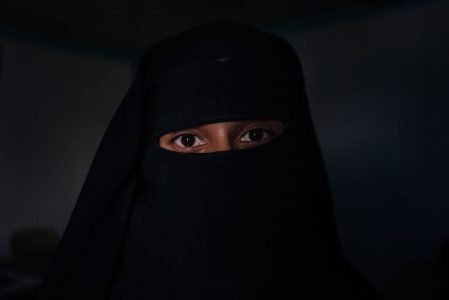
How Islamic State women and children are being left stranded in the desert
Heavily pregnant and a continent from home, 21-year-old Bint Fatma could find no doctors in her corner of the internment camp.
She waited hours in the October sun, fearing she was about to lose her baby, before guards agreed to take her to a clinic. There were no doctors there either, she said, and so it was decided: She would go back to her tent and await whatever God intended.
Outside, the nights were getting cold, she recounted earlier this month; sickness was spreading like wildfire. Beyond the chain-link fences, a war was brewing.
As with thousands of women from around the world, Bint Fatma’s journey from the Netherlands to this camp in the desert had taken her through the Islamic State’s rise and fall and into the heart of a global debate.
Governments worldwide have been wrestling with the question of whether women like Bint Fatma are conspirators or victims — and whether bringing them home is a moral imperative or a security risk. At stake, too, is the future of thousands of children born into the caliphate through no fault of their own.
Women contributed to the Islamic State’s propaganda and often became complicit in its crimes. Bint Fatma was among some 20,000 women who would stick it out to the end, when the last redoubt of the caliphate was overrun by U.S.-backed forces early this year and its final denizens were trucked to these tents in a dust bowl.
The Washington Post first met the young woman in late July near the entrance to the sprawling al-Hol camp in northeast Syria, home to about 70,000 women and children. Wearing a black burqa that concealed her growing belly, Bint Fatma removed her face covering for much of the interview, revealing brown eyes and slim features. She was garrulous, sometimes wary, and kept her eyes on her 3-year-old son throughout, soothing him gently as he scrambled around. The Washington Post has agreed to identify her by a family nickname only, out of concerns for her safety if it became widely known among camp residents she was speaking to the media.
With conditions deteriorating and radicals cementing control inside the camp, Bint Fatma described al-Hol as a “different world.” She wanted to go home to the Netherlands but knew the government was leery.
“I don’t know what my ending is,” she said.
As summer slipped into fall and debate raged back home, the need for that ending would become urgent. Her neighbors were trying to re-create their lost caliphate, enforcing its strictures with fear and violence. Then Turkey’s invasion of northern Syria placed the camp in peril and put her baby’s life in the balance.
The story of how her government — and others around the world — would decide the fate of the Islamic State women and children was fast becoming a historic test of what countries in the West and beyond were made of: Could they remain true to the principles they vaunted and still uphold the duty to safeguard their people?
Source: Washington Post





